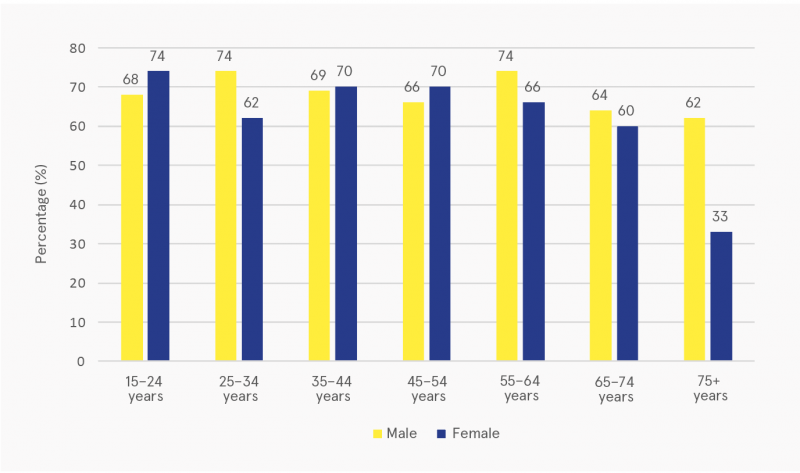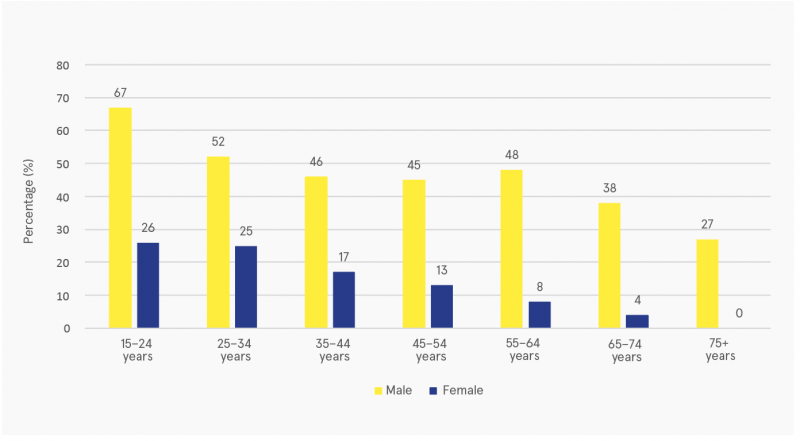Doyle, Anne  ORCID: https://orcid.org/0000-0002-2776-3476
(2023)
Healthy Ireland Survey 2022: summary of alcohol findings.
Drugnet Ireland,
Issue 84, Winter 2023,
pp. 30-32.
ORCID: https://orcid.org/0000-0002-2776-3476
(2023)
Healthy Ireland Survey 2022: summary of alcohol findings.
Drugnet Ireland,
Issue 84, Winter 2023,
pp. 30-32.
| Preview | Title | Contact |
|---|---|---|
|
PDF (Drugnet 84)
1MB |
Background
The eight wave of the Healthy Ireland Survey, carried out by Ipsos and commissioned by the Department of Health, involves a representative sample from the general population aged 15 years and over to increase knowledge of the population’s health and health behaviours.1 The survey is central to the Healthy Ireland Framework and subsequent Healthy Ireland Strategic Action Plan as it enables research and is a mechanism to monitor and evaluate the impact of policy initiatives under the framework.2,3
Telephone interviews took place with 7,455 respondents between November 2021 and July 2022. Along with questions about alcohol use, the survey examined general health, tobacco use, weight management, use of health services, dental and oral health, skin protection, menstrual health and period poverty, suicide awareness, and health behaviours during the Covid-19 pandemic.
Main findings on alcohol
Alcohol use
Two-thirds (67%) of the population aged 15 years and over reported consuming alcohol in the 6 months prior to the survey. Those aged 15–24 years (71%) and those aged 25–34 years (68%) were more likely to report consuming alcohol in the previous 6 months. Males (69%) were more likely than females (65%) to have consumed alcohol, although more young females aged 15–24 years (74%) reported alcohol use compared with males in the same age group (68%) (see Figure 1). In addition to more young females reporting alcohol use in the last 6 months compared to young males, there was a notable increase since the 2021 survey of females aged 15–24 years reporting alcohol use, from 67% in 2021 to 74% in 2022.

Figure 1: Percentage of respondents who consumed alcohol in the previous 6 months, by sex and age
Over one-half of drinkers reported drinking typically once per week (52%), while 32% reported drinking more than once per week. Males were more likely than females to report drinking multiple times per week (36% males vs 27% females).
Drinking behaviour changes since Covid-19
The percentage of respondents (13%) who reported drinking more since the start of the Covid-19 pandemic remained unchanged since the 2021 survey. However, in 2021, 42% of respondents reported that they were drinking less since the beginning of the pandemic, but this had decreased to 33% in 2022.
Binge drinking
Almost one-third (32%) of those who reported drinking in the previous 6 months reported binge drinking – defined as consuming six standard drinks or more in one sitting – higher than that reported in 2021 (22%). Males (48%) are more likely to report binge drinking compared with females (16%) and this applies to all age groups (see Figure 2).
Over one-quarter (27%) of parents who reported binge drinking on a typical drinking occasion indicated that children aged less than 16 years are present some of the time; this was slightly more commonly reported among fathers (29%) than mothers (24%).

Figure 2: Percentage of respondents who reported binge drinking in the previous 6 months, by sex and age
Drinking and social environments
More respondents who consumed alcohol (45%) reported drinking with one other person the last time they drank, 43% reported drinking with a group of people, and 11% drank alone. The latter was more common among male drinkers (16%) than female drinkers (7%) and among those who were unemployed (21%) and retired (17%).
Drinking at home was the most common location reported among drinkers (44%), with 30% drinking in a pub (more common among younger drinkers at 42%), 13% in a restaurant, hotel or café, and 10% drinking in someone else’s home on the last occasion they drank.
Conclusion
The Covid-19 pandemic has had an impact on drinking patterns, with more females in all age groups, except for those aged 25–34 years and those aged 75 years or more, reporting drinking in the last 6 months compared with the 2021 survey findings. The percentage of older males (75 years or over) reporting drinking in the last 6 months increased from 52% in 2021 to 62% in 2022. And although binge drinking has not returned to 2018 levels (28% of the population), it is higher in 2022 (22%) compared with the 2021 survey (20%), indicating that binge drinking has almost returned to pre-pandemic levels, particularly among males.
1 Ipsos (2022) Healthy Ireland Survey 2022: summary report. Dublin: Government Publications.
https://www.drugsandalcohol.ie/37636/
2 Department of Health (2013) Healthy Ireland: a framework for improved health and wellbeing 2013–2025. Dublin: Department of Health. https://www.drugsandalcohol.ie/19628/
3 Department of Health (2021) Healthy Ireland strategic action plan 2021–2025. Dublin: Government of Ireland.
https://www.drugsandalcohol.ie/34172/
Repository Staff Only: item control page